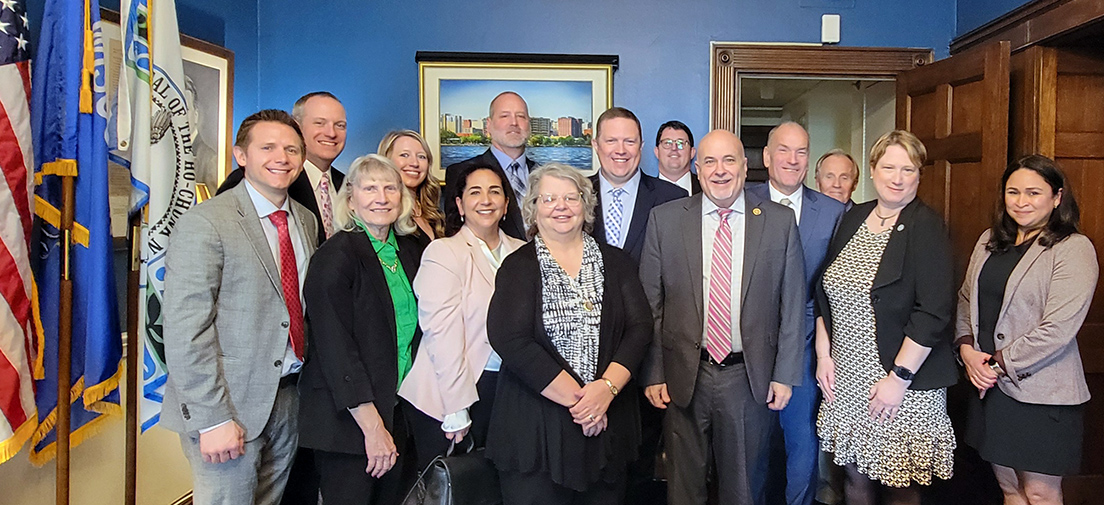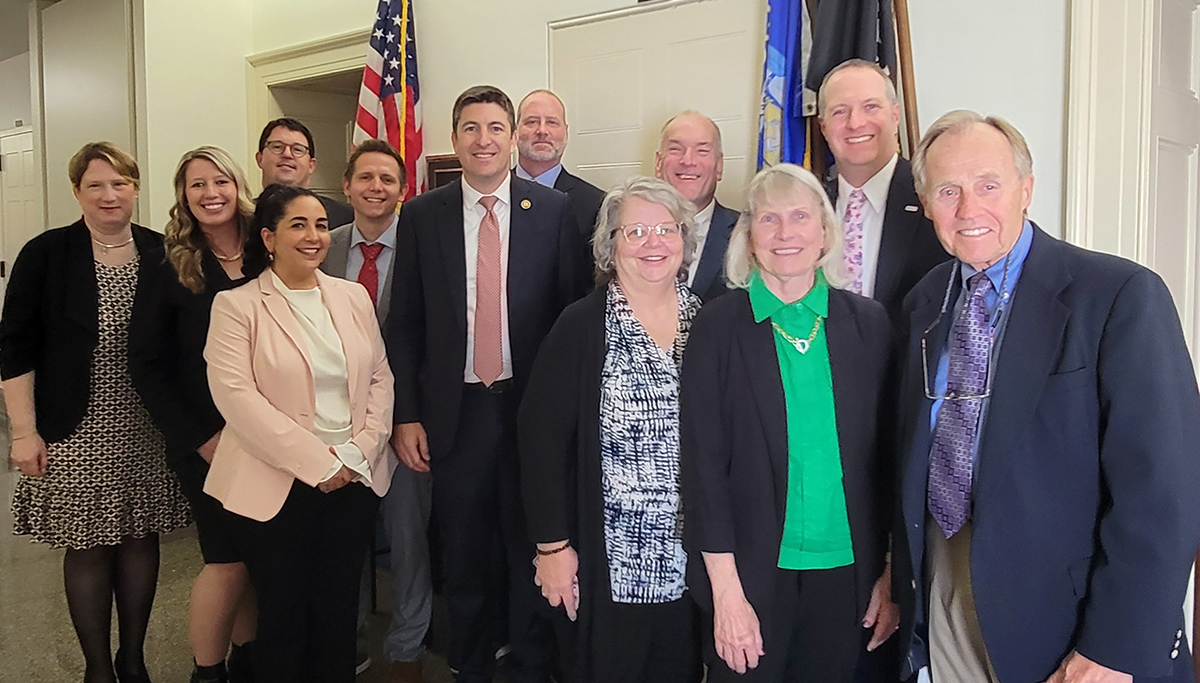The Wisconsin Hospital Association and leaders from hospitals and health systems from across the state traveled to Washington, D.C., to meet with Wisconsin’s congressional delegation on April 16.
Those participating included Tim McKevett of Beloit Health System, John Russell and Hannah Young of Prairie Ridge Health, Michelle Abey of Stoughton Health, Jerry Halverson, MD of Rogers Behavioral Health, Carina Marquez-Oberhoffner of Gundersen Health System, Brad Wolters of Marshfield Clinic Health System, Camille Rodriguez of Hospital Sisters Health System, Jeremy Levin of the Rural Wisconsin Health Cooperative, Bill McCollough, Julie Steiner, and Cindy Hermel of Partners of WHA as well as Eric Borgerding and Jon Hoelter of WHA.
 WHA and hospital leaders met with Rep. Mark Pocan
WHA and hospital leaders met with Rep. Mark Pocan
Among the main discussion topics WHA advocated for were sustaining the
340B prescription drug discount program, extending funding and authorization for
telehealth, the hospital at home program, and Medicare-Dependent and Low Volume hospitals, and
concerns about health insurance prior authorization practices and continued Medicare underfunding.
In particular, WHA is pushing for support of the SUSTAIN 340B Act in the Senate and Protect 340B Act in the House. The House legislation would prohibit pharmacy benefit managers from discriminating against 340B hospitals by slashing their reimbursements just because they participate in 340B. The Senate legislation would include a similar provision and would also prohibit drug manufacturers from denying discounts at contract pharmacies while also requiring hospitals to report additional 340B information. See
this recent article from The Valued Voice for more information.
WHA’s group of hospital advocates also pushed for Congress to extend a number of important health care provisions that are expiring at the end of 2024, including:
- Telehealth waivers - Prior to the COVID-19 pandemic, Medicare did not reimburse for telehealth delivered to a patient's home. The patient was required to be seen at a health care facility, and even then Medicare would only reimburse if that facility was in a rural, health professional shortage area. Without an extension of these waivers, Medicare would revert back to that policy.
- Hospital at Home - CMS authorized the Acute Hospital Care at Home program to expand access to care during the COVID-19 pandemic. The program allows people with low acuity conditions to receive a hospital level of care equivalent to an inpatient stay in the comfort of their own home along with daily visits by nurses and telehealth visits from physicians. It has been an important tool for hospitals to increase capacity given the continued challenges of finding post-acute care placements which are continuing to create bottlenecks in the health care system.
- Medicare-Dependent (MDH) and Low-Volume Adjustment Hospitals (LVH) - Wisconsin has approximately 16 "tweener" hospitals that are too large to be considered critical access hospitals but also too small to have the volumes necessary to offset Medicare and Medicaid losses. These MDH and LVH hospitals receive slightly enhanced Medicare reimbursement rates to help offset their Medicare losses.
Lastly, WHA's hospital leaders expressed concern over the continued underfunding of hospital Medicare reimbursements as well as the impact prior authorization is having on increasing costs and bureaucracy in the health care system. Because Wisconsin has an aging population, more and more people are moving off commercial insurance and onto Medicare every day. With Wisconsin hospitals only receiving about 73% of what it costs them to provide care to Medicare patients, the statewide overall level of Medicare payments has grown 86% since 2016—from -$1.8 billion to -$3.3 billion in 2022. CMS's annual inflationary adjustments have also continued to be well below the rate of true inflation and below even what the Medicare Payment Advisory Commission is recommending.
 WHA and hospital leaders met with Rep. Bryan Steil
WHA and hospital leaders met with Rep. Bryan Steil
While this would be challenging enough on its own, the increasingly aggressive prior authorization policies from commercial health insurers are adding unnecessary costs and bureaucracy to the health care system. According to a WHA survey of its members, not only are 93-94% of all prior authorization (PA) claims eventually approved, raising alarm bells about why so many services require PA to begin with, but 87% of commercial claims initially denied get overturned upon appeal, raising even more alarm bills about why so many are denied. WHA asked lawmakers to consider legislation to reform the PA process to reduce unnecessary waste and bureaucracy in health care.
"I want to extend a sincere thank you to our hospital leaders and volunteers who joined us for this very important trip to meet with our Wisconsin Congressional Delegation," said WHA President and CEO Eric Borgerding. "This is a particularly challenging time for hospitals who continue to face underfunding from the Medicare program along with continued uncertainty about how Congress will address our challenges. These visits with our lawmakers are critical; they get to see firsthand accounts of why it is so important for them to continue funding programs that will allow Wisconsin to sustain high quality care, while also hopefully finding longer-term solutions to growing structural issues with Medicare.”